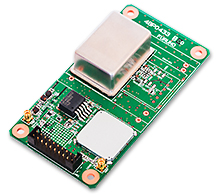Articles for ITS market MaaS (Mobility as a Service) "town development." Full-scale promotion for a national project
220 seats of Regional Collaboration Meeting on Mobility Services were fully occupied by the pre-reservation stage.
At 10:00 a.m. on February 15, 2019 the conference room near JR Tokyo Station was filled with businesspeople. The 220 seats prepared had already been filled two weeks prior to the opening of the internet pre-reservation.
The name of this event is "Regional Collaboration Meeting on Mobility Services". It was sponsored by the Ministry of Economy, Trade and Industry (METI).
Dr. Haruo Ishida, emeritus professor, University of Tsukuba, emphasized that "There have been various cooperative meetings, including EV (Electric Vehicle) and automated driving, and I have been chairing these meetings. However at this time the handling of mobility services is an urgent need and needs to become popular in Japan. Therefore serious discussions are needed."
Next, Mr. Hirokazu Kobayashi, Director of the Automobile Division and Counselor, METI and Mr. kyoji Koramochi, Director of the Ministry of Land, Infrastructure, Transport and Tourism (MLIT), Policy Bureau, Public Transport Policy Department, Transport Planning Division, explained the national policy and willingness to deal with the issue.
In addition, representatives from Maebashi City in Gunma Prefecture, Yokosuka City in Kanagawa Prefecture, Tsukuba City in Ibaraki Prefecture, Eiheiji-cho in Fukui Prefecture, Minamisoma City in Fukushima Prefecture and Miyoshi City in Hiroshima Prefecture (and Mazda) introduced new traffic policies that into account the traffic conditions and characteristics of each region.
Subsequently NTT DoCoMo, JR-EAST and SOFTBANK who are private companies described the details of new transportation system services.
What prompted holding this timely collaboration meeting?
Implemented nationwide MaaS action plans
In recent years the automotive industry has often heard the phrase "Revolution once every 100 years."
Their comment is based on the forecast that R&D on technologies such as EVs, automated driving, and connected cars will be integrated and connected cars will be integrated and implemented socially as Mobility as a Services (MaaS). MaaS aims to provide more comfortable and fulfilling lives and more efficient management for enterprises through services that combine a variety of mobile efficiencies.
Typical examples of MaaS include “Ride Sharing” which is rapidly becoming popular in the United States, China, Southeast Asia, India and other countries.
Ride sharing services include not only automobiles but also bicycles and electric scooters within the past 1 or 2 years. However price competition among service providers, law non-compliance issues and troubles with local residents have already occurred causing increased provider bankruptcies.
In January 2018, Nordic Finland enacted laws requiring the sharing of public transport data including buses, trains and taxis. In response global public transport restructuring has been intensified, including the launch of services that allow public transport to be used at a fixed monthly rate.
METI analyzed these trends worldwide and held an expert meeting at MaaS in 2018. In October of the same year the interim consolidation was announced.
In addition the MaaS action plan is scheduled to be implemented nationwide in FY2019. The "Regional Collaboration Meeting on Mobility Services" is the kick-off.
From the theoretical to social implementation. NTT DoCoMo-centered "Yokosuka x Smart Mobility Challenge"
 NTT DoCoMo R & D center which is the center of YRP
NTT DoCoMo R & D center which is the center of YRP
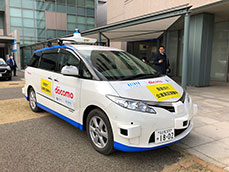 Level 4 Automated Driving Vehicle implemented in conjunction with NTT DoCoMo and Tier IV.
Level 4 Automated Driving Vehicle implemented in conjunction with NTT DoCoMo and Tier IV.
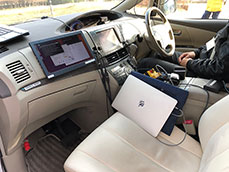 Inside the vehicle. An auxiliary brake is equipped in the passenger’s seat area.
Inside the vehicle. An auxiliary brake is equipped in the passenger’s seat area.
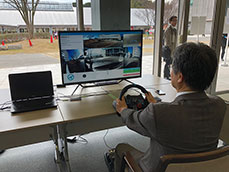 A system for remotely operating the vehicle.
A system for remotely operating the vehicle.
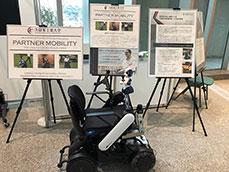 The announcement of business model and research results using personal mobility were remarkable.
The announcement of business model and research results using personal mobility were remarkable.
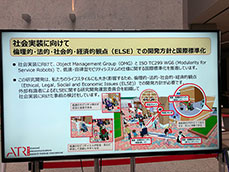 Introduction of technologies using Wi-Fi to prevent electric chairs from colliding with crowds.
Introduction of technologies using Wi-Fi to prevent electric chairs from colliding with crowds.
Local governments participating in the Regional Collaboration Meeting on Mobility Services have already taken action in anticipation of their participation in the FY2019 Action Plan.
Among them Yokosuka City attracts attention. "Yokosuka × Smart Mobility Challenge" (From January 24th to 26th, 2019) was held at Yokosuka Research Park (YRP) where NTT DoCoMo and other telecommunications companies are included in the Advanced Technology Research and Development Center.
It is an attempt to transform Yokosuka into a town that is easier to live in by collaborating with companies and organizations in the vicinity of Yokosuka such as researchers at Yokohama National University and Keihin Expressway a local transportation company.
In the field various mobility services utilizing communication technologies such as 5G were exhibited as prototypes.
For example, in a level 4 automated taxi developed jointly by the venture company Tier IV and NTT DoCoMo the vehicle ran on a public road on the YRP site without anyone sitting in the driver's seat. The equipment installed in the YRP facility is used for the operation and operations can be carried out by remote control. Such public roads have already been tested in Nagoya and elsewhere, but this time with the permission of the local police it became possible to drive at an upper limit of 40 Km/h. The passenger's seat area is equipped with a brake pedal for an emergency stop and the system administrator always rides in the passenger's seat during operations.
In addition an efficient bus and taxi dispatch system in which NTT DoCoMo collaborated with the venture company "Mirai Share" from Future University Hakodate was introduced. There were various technical exhibitions such as technology using Wi-Fi for avoiding personal mobility of electric wheelchairs and similar devices traveling in the room from contacting pedestrians.
In addition various symposiums and idea sessions were also held to enable citizens to attend the seminars.
Various attempts will begin in fiscal 2019, including in Yokosuka City for new mobility services in Japan.
Writer introduction

Mr. Kenji Momota Automotive journalist
His major is the world automotive industry and he is also familiar with the energy industry, IT and the aging society problem as the related fields. He acts around the world based in Japan and USA and writes for the general magazines, the technology journals and the automotive related media etc.
He is also commentator of motor race and world's motor show on TV program based on his career of the driver of Indy Racing League and NASCAR. In recent years, he has been covering about a paradigm shift from developed countries to developing countries, the motorized vehicle like EV and the telematics.
FURUNO ITS Journal
Click here for the latest articles after 2022 (in Japanese)2022
- The "realistic" self-driving roadmap shown by the Japanese government and a hands-on report on the latest Subaru EyeSight X
- Will FCVs (Fuel Cell Vehicles) Become Popular? ~New Movement in Toyota and Honda~
- The 'Complete' online sales of new cars start in Japan. Will this new way of buying cars take root?
- Many Firsts! On-Site Report from Tokyo Auto Salon 2022 - The author, who knows what goes on behind the scenes, looks back on 40 years of history. -
2021
- "Moving toward zero traffic fatalities for four-wheeled and two-wheeled vehicles globally in 2050" ~Experience on Honda's latest safety technologies~
- Tsuneishi Shipbuilding's building and DX, an exclusive visit to the main factory
- Japan's Smart City: New Moves toward Practical Use
- When will self-driving buses (service cars) be put to "full-scale" practical use?
- Utilization vehicle data during disasters
- Toyota-led Connected Technology to Transform Commercial Vehicle Business -From light trucks to large trucks and buses-
- Toyota enters the connected car "Personalization" business
- Japanese automakers' carbon-neutral strategies swept up in ESG investment
- Drive experience of the latest autonomous vehicle models and advanced driving support systems
- Will carbon neutrality accelerate the trend to strengthen LCA (Life Cycle Assessment)?
- Semiconductor shortage exposes realities of the automotive industry
- Online Autonomous Driving Contest Enhancing development of Human Resources
2020
- What happens to CASE when gas cars are banned in Japan?
- When will Flying Cars be launched?
- Expectation vs. reality:Autonomous Driving in Japan
- V2X, Becoming increasingly important in autonomous driving
- Technology of Subaru “EyeSight X”
- Lifestyle-oriented French cars gain popularity in Japan
- Human-oriented smart cities are wanted
- MaaS and CASE, how would automotive industry change after COVID-19?
- The beginning of virtualization era, triggered by COVID-19
- Trend of EV shift and consumer demands
- TOYOTA Press conference about ADAS - Releasing algorithm for "sudden acceleration suppression during attempted sudden acceleration" free of charge -
- The Japanese automotive industry in 2020 - 3 turning points -
- "Using a smartphone while driving" and "Level 3 automated driving"
2019
- Motor show business model is at a turning point - Tokyo Motor Show Report -
- Commercialization and monetization of MaaS - ITS World Congress Singapore Report -
- Android Automotive pays attention to V2X - Report from the Frankfurt Motor Show 2019 in Germany -
- Automobile Distribution Revolution and DCM (Data Communication Module)
- Connected business potential and newly proposed "eMaaS" by Honda
- 5G services for practical use are multiplying
- Connectivity technologies attracting attention due to frequent traffic accidents
- Shanghai Motor Show report -SUV, EV, Automated car & 5G-
- Drone Business roadmap and updates to Michibiki (Quasi-Zenith Satellite System)
- MaaS (Mobility as a Service) "town development." Full-scale promotion for a national project
- CES organizer states "Data Period in 2020s." Transformation of the Automotive Industry in CES, US "-CES2019 Report-"
- "Return to Origin" directed towards the age of change, automatic operation and connectivity
2018
- New proposal for Private Car Automated Driving Level and other Hot 5G Technology Topics
- Standardized EV charging infrastructure concerns in Europe, US, Japan and China - Kobe EVS 31 field report -
- Touring a pure car carrier and a test drive of the latest hybrid car
- Planning stage products are exhibited at the newly established visualized mobility service "TOYOTA MOBILITY SHOWROOM".
- Potential “Community Car-share” program promoted by local residents
- CES Asia Report 2108
- Companies attempt new Vehicle-to-Infrastructure communications, including traffic volume measurements and vehicle positioning. -ITS Asia Pacific Forum in Fukuoka-
- Geneva show in Switzerland. Flying cars and MaaS (Mobility as a Service) were hot topics.
- EV (Electric Vehicle) proposals by country
- MaaS competition through service mobilization, M & A and technical field collaboration is accelerating. - The CES 2018 Report -
2017
- Big data’s initiative and fight for the automotive industry. Cooperation among companies becomes increasingly important.
- Connected car and road-to-vehicle communication automatic operation
- ETC (Electronic Toll Collection) and ETC2.0. Current situation and projected future
- Rapid development of sharing economy
- Germany is first to recognize level 3 automated driving
- ITS EU 2017 Field Reports -Automatic Operation and the eCall-
- From Infotainment to ITS, the competitive area is spreading in the car big data industry.
- GTC (GPU Technology Conference) Report and the de facto standardization of AI (artificial intelligence)
- Renesas' new challenge! "e-AI Solution" and "Renesas Autonomy"
- The Automobile industry is shifting from a manufacturing industry to a service industry.
- The movement toward accident countermeasures for aging drivers in Japan
- Fusion of ride sharing and fully automated driving is advancing in the USA.
2016
- Overview of the Quasi-Zenith Satellite System (QZSS) and advancements toward full-scale practical use including the Tokyo Olympic Games - G-space EXPO 2016 report-
- Japan’s automated driving project "SIP-adus" will be a large demonstration experiment.
- The International Home Care & Rehabilitation Exhibition. There were many car manufactures with exhibits booths at this show.
- Japanese car manufacturers starting to concentrate on strengthening the ADAS system
- A new movement of legislation for autonomous cars
- Cyber Security and “AGL”, the new OS for automotive are hot topics in the connected car industry
- “High precision 3D map” the key future of autonomous car and pedestrian dead reckoning
- Chinese “BAT” is accelerating their business in the EV (Electric Vehicle) market
- Tesla's original connection to Taiwan and the new transportation system technologies.
- "The main topic" of the Geneva Motor Show was how to strengthen "pedestrian protection"
- The probe data business is getting more competitive
- Reporting directly from the 2016 CES show "Data services will soon become the main revenue source of automotive industry"
2015
- Do the automated driving systems need the GNSS (Global Navigation Satellite System) ?
- ETC Version 2.0 is coming soon. A new service was announced at the Tokyo Motor Show and the possibility that is could be used as a device for older drivers.
- "Connected Horizon" and "eHorizon". Germany's leading parts supplier accelerates strengthening of "Big Data" for business



 The Regional Collaboration Meeting on Mobility Services was held at the conference room at JR Station Tokyo.
The Regional Collaboration Meeting on Mobility Services was held at the conference room at JR Station Tokyo.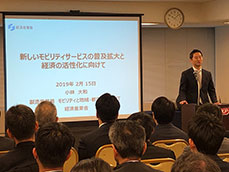 Mr. Hirokazu Kobayashi, Deputy Director, METI explains the national policy.
Mr. Hirokazu Kobayashi, Deputy Director, METI explains the national policy.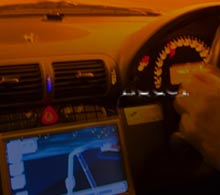 GPS/GNSS Receiver&Chips and Modules (positioning and timing)
GPS/GNSS Receiver&Chips and Modules (positioning and timing)